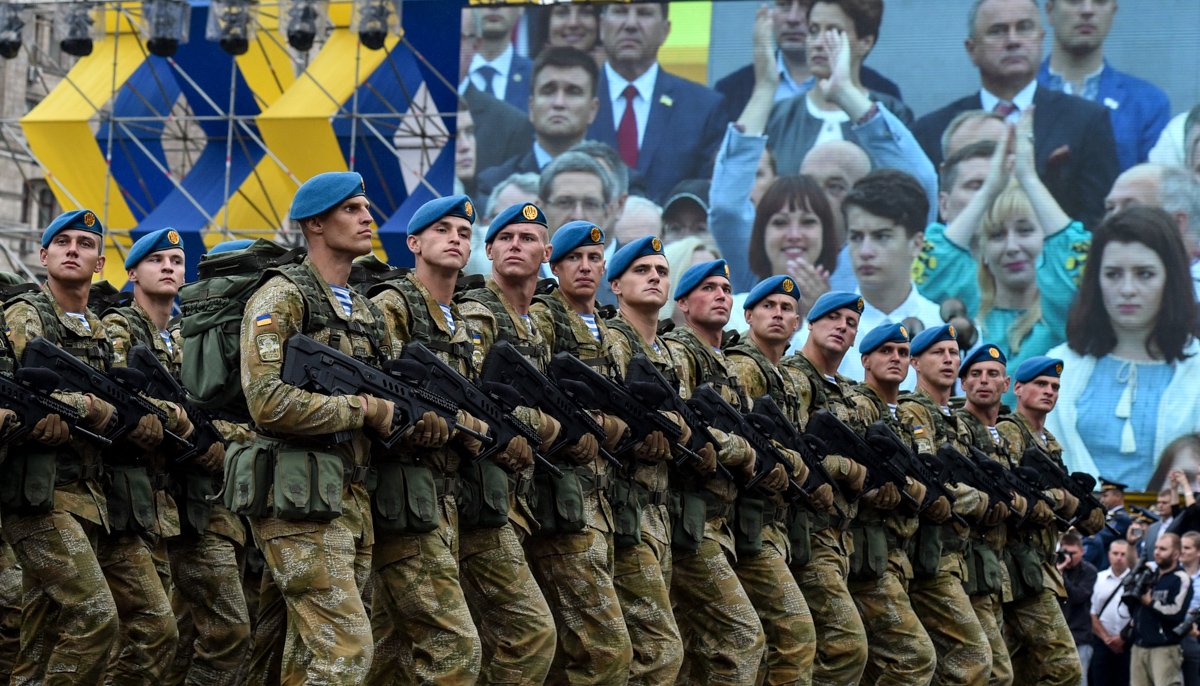Ukraine marks 30 years of independence this summer with much to celebrate and plenty to regret. Three decades after the Soviet collapse, today’s Ukraine remains among Europe’s poorest and most corrupt countries, but it has succeeded in consolidating the transition to democracy and cultivated a strong sense of national identity that has helped Ukrainians reclaim their past and choose their own future.
Many of the key statistics do not present a very optimistic picture of Ukraine’s post-Soviet experience. The population of the country has plummeted since the collapse of the USSR, declining from a high in 1991 of around 52 million to the current unconfirmed figure of approximately 44 million (including Russian-occupied Crimea). Even this reduced figure is contentious, with many critics claiming the real number is significantly lower.
Ukraine’s shrinking population is due to a number of factors including low fertility rates and high levels of migration. Since the dawn of independence, millions of Ukrainians have left the country in search of better employment prospects and a higher standard of living, leading to the steady depopulation of rural areas and creating an entire generation of Ukrainian children raised without absentee parents.
The economic data for post-Soviet Ukraine makes for similarly uncomfortable reading. In 1991, many observers expected Ukraine to become the biggest economic success story among the former Soviet republics. This initial optimism was easy to understand. After all, Ukraine was a potential agricultural and industrial powerhouse boasting a favorable geographical location along with a wealth of natural resources and a highly educated population.
Instead, Ukraine has steadily lost ground against all of its neighbors. The country’s GDP currently stands at roughly double the figure in 1991, but this number is dwarfed by the far greater growth witnessed over the same period in nearby Poland and the Baltic States. Even authoritarian Russia and Belarus have significantly outperformed Ukraine economically.
This uninspiring outcome is typically blamed on Ukraine’s failure to combat the chronic corruption that has infected whole sectors of the economy throughout the past three decades. Since the early 1990s, a small group of oligarchs have controlled Ukraine’s key resources and used their wealth to dominate not only the Ukrainian economy but also the political arena and the mainstream media. Naturally, it has been in their interests to maintain the corrupt status quo.
This all-pervading oligarch influence has consistently served as an obstacle to anti-corruption reforms and prevented Ukraine from establishing genuine rule of law in the country.
As a result, the economy has remained inefficient and international investment into Ukraine has been a mere fraction of the volumes seen in nearby countries.
Ukraine’s oligarchs have proven impossible to dislodge, despite two separate popular uprisings calling for fundamental change within the country’s corrupt establishment. Nevertheless, it would be short-sighted to write off Ukraine’s 2004 Orange Revolution and 2014 Euromaidan Revolution as failures. Instead, Ukraine’s two post-Soviet revolutions are best understood as landmark events in the country’s ongoing nation-building odyssey.
The Orange Revolution was post-Soviet Ukraine’s great democratic breakthrough. At a time when the neighboring Putin regime was slowly but surely returning to the authoritarianism of the Soviet era, Ukraine’s success in overturning a rigged presidential vote and holding a free and fair election put the country on an entirely separate developmental path. Ten years later, the Euromaidan Revolution confirmed Ukraine’s European choice and consolidated the country’s fledgling democracy.
These twin events have had a profound impact on how Ukrainians view themselves and their country. The revolutions of 2004 and 2014 helped shape and reinforce perceptions of Ukraine as a land of freedoms and rights, albeit often imperfectly observed. They placed Ukraine firmly within the European tradition of democratic government and dramatically undermined longstanding myths of eternal brotherhood with Russia.
Within days of Ukraine’s 2014 Euromaidan Revolution, Russia invaded. The Kremlin seizure of Crimea and the ongoing conflict in eastern Ukraine have transformed the geopolitical climate in the entire post-Soviet region and plunged the world into a new Cold War. Ukraine itself has paid a terrible price, with an estimated 14,000 Ukrainians killed and millions displaced.
In many ways, the conflict with Russia has accelerated nation-building processes that were already underway in Ukraine prior to the outbreak of hostilities in 2014. It has also removed much of the geopolitical ambiguity surrounding the country. Seven years since the start of Russian aggression, clear majorities of Ukrainians now support the idea of NATO and European Union membership.
The war has also helped to unite Ukrainians. For much of the country’s early post-Soviet history, Ukraine was seen as being divided into pro-European west and pro-Russian east. While this depiction was always overly simplistic, it is now hopelessly outdated. Indeed, the winners of Ukraine’s past two presidential elections in 2014 and 2019 both secured clear majorities in virtually every single region of the country while campaigning for Euro-Atlantic integration.
As Ukraine has turned west, support for the country’s pro-Russian politicians has slumped. Until 2014, Moscow-leaning parties could expect to secure around 40% in parliamentary elections, while Kremlin-friendly candidate Viktor Yanukovych had won the presidency as recently as 2010. With the war generating understandable hostility towards the Kremlin, and with key pro-Russian electorates in occupied Crimea and eastern Ukraine effectively disenfranchised, Ukraine’s pro-Russian political forces are now a shadow of their former selves and no longer have any realistic pathway back to power as long as Ukraine remains a democracy.
Ukraine reaches the 30-year statehood milestone still very much a work in progress. It has overcome many of the identity issues inherited from the Soviet past and established a robust democratic political culture that clearly positions Ukraine within the wider European community of nations. However, unless the country’s oligarch elite can finally be tamed, Ukraine will continue to fall behind its neighbors and remain vulnerable to further Russian aggression.
